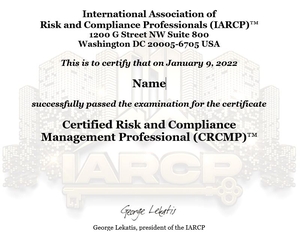The role of the risk officer
The role of the risk officer

Organizations and companies typically assemble a risk management team to help decision makers go through the risk management process.
While the team members do not have to be risk experts, they must gain an understanding of the environment in which the risks are to be managed, taking into account political and policy concerns, mission needs, stakeholder interests, and risk tolerance.
Defining the context will inform and shape successive stages of the risk management cycle.
Risk managers are involved in the process to:
1. Identify Potential Risk - There is a need to consider a wide variety of risks to support decision making. These considerations include strategic, operational, and institutional risks.
The risks that are included in any particular assessment (sometimes called the assessment’s scope) are largely determined by the decision the assessment is designed to inform.
Unusual, Unlikely, and Emerging Risks - Prior to conducting a risk assessment, it is important to make a concerted effort to identify risks beyond those usually considered. For example, risks that are newly developing, even if they are poorly understood.
Risks that are highly unlikely but have high consequences should also be identified and incorporated into the assessment. This can even include identifying the risk of the unknown as a possible risk.
Brainstorming is a common technique to identify these unusual, emerging, and rare risks. So, too, is involving a wide range of perspectives and strategic thinkers to avoid the trap of conventional wisdom and groupthink.
Even when a risk is difficult to assess, it may still be important to try to understand and should be noted. It should also be acknowledged that no identification of risks is likely to capture every potential unwanted outcome — there will always be things that happen that are unanticipated.
2. Assess and Analyze Risk - There is a need to assess the identified risks and analyze the outputs of the assessment. This step consists of several tasks:
- Determining a methodology;
- Gathering data;
- Executing the methodology;
- Validating and verifying the data; and
- Analyzing the outputs.
In practice, these tasks, like the steps of the larger risk management cycle, rarely occur linearly. Instead, risk practitioners often move back and forth between the tasks, such as refining a methodology after some data has been gathered.
Likelihood is the chance of something happening, whether defined, measured, or estimated in terms of general descriptors, frequencies, or probabilities.
Consequence, or impact, is the effect of an incident, event, or occurrence, whether direct or indirect. In risk analysis, consequences include (but are not limited to) loss of life, injuries, economic impacts, psychological consequences, environmental degradation, and inability to execute essential missions.
3. Develop Alternatives - In order to improve the ability to prevent, protect against, respond to, recover from, and mitigate a variety of manmade and natural hazards, leaders must focus their attention on identifying and executing actions to manage risks.
Ultimately, the objective of risk analysis is to provide decision makers with a structured way to identify and choose risk management actions.
Within the risk management process, the step of developing alternatives involves systematically identifying and assessing available risk management options.
Portions of this step may be performed by different practitioners, but the alternatives development phase brings together proposed risk management actions with the results of a risk assessment, to include course-of-action comparisons.
This provides leaders with a clear picture of the risk management benefits of each proposed action or group of actions.
The picture of potential benefits, when combined with an analysis of an action’s costs — both monetary and non-monetary — can serve as a valuable resource for aiding decision makers in making effective and efficient homeland security choices.
4. Decide Upon and Implement Risk Management Strategies - Risk management entails making decisions about best options among a number of alternatives in an uncertain environment.
The key moment in the execution of any risk management process is when a decision maker chooses among alternatives for managing risks, and makes the decision to implement the selected course of action.
This can include making an affirmative decision to implement a new alternative, as well as the decision to maintain the status quo.
5. Evaluate and Monitor - The evaluation and monitoring of performance is important, to determine whether the implemented risk management options achieved the stated goals and objectives. In addition to assessing performance, organizations should guard against unintended adverse impacts, such as creating additional risk or failing to recognize changes in risk characteristics.
The evaluation phase is designed to bring a systematic, disciplined approach to assessing and improving the effectiveness of risk management program implementation. It is not just the implementation that needs to be evaluated and improved; it is the actual risk reduction measures themselves.
Evaluation should be conducted in a way that is commensurate with both the level of risk and the scope of the mission.
You may also visit:
What is Risk? https://www.risk-officer.com/What_is_Risk.htm
Risk officers, job descriptions
Case Study 1: Risk Officer, Cover Genius
Cover Genius is looking for an experienced risk officer to join our team to support the company’s growing business and provide support as we scale. The Risk Officer will provide the business (1st line of defense) effective and timely risk management (2nd line of defense) challenge and advice, representing a risk management viewpoint in business identification, measurement, management and reporting of risks and internal controls, and specifically in relation to any allocated responsibilities.
You will create the risk management strategy and implement the risk management framework across the global insurance entities Cover Genius owns and controls. In this role you will address and respond to risk issues as they may arise, escalating high priority issues or key matters to the Executive team and governance bodies as appropriate.
What Your Work Week Will Look Like
- You will perform the on-going monitoring and assessments of risks captured in the risk register to enable the identification of top risks, potential new risks or emerging risks.
- Provide second line oversight and support to ensure the Company’s risk appetite, control framework and policies are clearly documented, communicated and adhered to.
- Ensure appropriate and insightful risk reporting including reporting to the Risk Committee and development and monitoring of KRIs.
- Own allocated risks in the risk register and facilitate regular risk and control assessments. This may include strategic, insurance, operational (including data, IT and cyber security), and financial risks.
- Provide input into the annual business strategy and planning processes to ensure strategic risks are identified, appropriately considered and documented.
- Monitor and assess operational risk exposures, events, business and IT incidents to ensure such cases are appropriately escalated.
- Support the business in development and implementation of appropriate risk controls to mitigate such incidents.
- Embedding an appropriate risk culture.
- Create and maintain appropriate key risk indicators (KRIs) and trigger limits to track the trends in risk exposures.
- Collaborate with internal partners to ensure effective key controls are appropriately designed and are operating effectively to mitigate identified risks in the risk register.
- Where relevant, you will also partner with relevant business stakeholders to design and implement pragmatic recommendations and actions for reducing exposures to risk where these exceed appetite or tolerance, ensuring the timely communication of such with the Risk Owner.
- To lead and conduct risk assessments, reviews or investigations of topics that may arise from time to time. This may include risk assessments on important outsourcing or third-party risk management arrangements, second line of hot risk topics or areas of concerns, emerging risks, new business initiatives or regulatory topics.
- Lead, contribute and/or deliver risk training and awareness initiatives on behalf of the Risk team as may be required.
- Other risk management departmental activities as and when required could include Business Continuity Management / Operational Resilience.
Case Study 2: National Risk Officer, Morgan Stanley
The National Risk Officer is responsible for a wide variety of supervisory, compliance and risk functions. In conjunction with the Senior Complex Risk Officer (SCRO) and the Associate / Regional Risk Officer (RRO/ARRO), the National Risk Officer has accountability for maintaining a consistent controlled environment through adherence of business ethics and practices and adherence to all applicable Federal, State and Local laws, Morgan Stanley Wealth Management policies, and other regulations.
This position will support various risk and supervisory functions for a single Complex and/or multiple Complexes within a single Region and may provide Risk Officer coverage for functions specific to a single Complex, a single Branch, or multiple branches within a Region.
Duties And Responsibilities
- Primarily responsible for all risk, supervisory, and compliance functions for respective branch location(s).
- Reviews and responds to a variety of supervisory alerts in a timely and sufficient manner.
- Fill coverage and/or resource gaps resulting from temporary Risk Officer attrition, shortages (e.g., turnover, resignations, etc.).
- Assist Complexes during periods of high-volume supervisory alerts.
- Manages and responds to senior or vulnerable adult, financial exploitation, diminished capacity, or other concerns affecting Morgan Stanley’s senior or vulnerable clients.
- Facilitates any supervisory inquiry or process that requires escalation from the Senior Complex Risk Officer (SCRO) and/or the Associate/Regional Risk Officer (A/RRO).
- Provides coaching, guidance, and education to Financial Advisors on policies and procedures to promote risk awareness and a compliant environment.
- Interview clients where necessary, and collaborates with internal partners in Legal, Compliance, Risk and Business to formulate adequate responses to close matters and/or pending supervisory alerts.
- Liaises with the Legal and Compliance Division to respond to customer complaints and litigation.
- Supports the preparation for and response to all branch exams and internal audits, and ensures that any audit findings are appropriately responded to and remediated.
- National Risk Officers may travel to different Complexes within the Region to provide support, as needed.
Case Study 3: First Line Enterprise Risk Officer, Cross River
Reporting into the Head of Line One Risk, we are seeking an experienced First Line Enterprise Risk Officer who will cultivate and execute against a strong Line One Risk culture in working with Senior Business Leaders, Clients, and Line Two Risk partners. This role is responsible for ensuring the adherence and execution of risk pillars across the entire product and client life cycle while understanding the competitive landscape of the Fintech Bank industry in a regulated Bank environment.
The First Line Enterprise Risk Officer will act as the liaison and advisor to our Business Line Leaders and clients acting as advisor with sound and comprehensive risk expertise across all risk pillars and executing against an enterprise risk management program. He/She will stand-up and drive a strong Line One of Defense risk governance program while balancing client needs and regulatory mandates.
The First Line Enterprise Risk Officer will be the forefront, strategic leader in ensuring adherence of the Bank’s Risk Appetite and program via partnership with internal Second line Risk colleagues:
- Be the forefront Line One Risk leader/ first line of defense across all Fintech Business Units (Market Place Lending, Banking as a Service, and our Payments solutions) to effectively identify, manage, remediate risks across all risk pillars in working with internal partners: Compliance, Operational, Credit, Reputational Risk, etc.
- Lead and act as primary Line One Risk liaison throughout the Client life cycle in partnership with Line Two Risk.
- Prospect evaluation of emerging risk to the bank.
- On-boarding due diligence.
- Portfolio management/ annual due diligence.
- In concert with our Client Relationship Manager, this role will work in parallel to understand client’s business activities, strategies, and changes to effectively assess, monitor, remediate risk.
- Act as the primary liaison and owner for client’s annual risk due diligence: working in parallel with the Client, Client Relationship Manager, and Line Two Risk Partners, assessing, capturing new and emerging issues and effectively remediating identified risks.
- Creates effective Line One Risk program in adherence with defined Bank Risk Appetite and Bank Policies, advises senior management of identified weaknesses, emerging issues and can critically assess issue criticality, impact and escalate appropriately.
- Maintain a comprehensive understanding of existing and emerging regulatory requirements, operational processes, inherent risks, and internal policies and practices to provide advice to stakeholders.
- Anticipates business needs and proactively identifies opportunities to improve and strengthen the control environment through sound framework, execution and defined SLAs.
- In support of the Head of Line One Risk and Head of Fintech Banking, lead large and complex initiatives and programs to identify and assess risks and controls, develop strategies to remediate gaps identified, and implement processes to effectively manage and mitigate risk in the first line.
- Participate in management operating committees as required.
- Stand-up, recruit and develop a strong line one Enterprise Risk team.
Case Study 4: Lead Operational Risk Officer, Wells Fargo, India
Wells Fargo is seeking a Lead Operational Risk Officer. The selected candidate will focus on following responsibilities/duties:
- Evaluate the adequacy and effectiveness of applicable policies, procedures, processes, systems and internal controls.
- Perform gap analysis on policy requirements for risk types aligned to various operational and Technology processes.
- Provide monitoring and independent oversight of the execution of technology, info security, and information management risk as they relate to policy and standards, including the independent oversight of the build out of a new front line process dedicated to the end-to-end risk management lifecycle.
- Develop, implement, and support an effective control review and challenge process to provide transparency, accountability and escalation of control effectiveness.
- Consult with frontline partners and other independent risk management teams to open issues related to control failures.
- Validate/evaluate appropriateness, completeness, effectiveness and sustainability of corrective actions taken to address situations defined as issues.
- Perform activities required under the Wells Fargo Operational Risk Program Policy and related policies and procedures.
- Review and challenge adequacy and efficiency of the front-line controls.
- Create reports and memos communicating oversight results.
- Support responses to internal testing, audits or regulatory examinations as needed.
- Conduct independent risk management reviews and identify control expectations with primary focus on technology processes/applications.
- Experience developing risk metrics and trending reports.
- Ability to synthesize data from a variety of sources and deliver results quickly.
Case Study 5: Risk Officer, NatWest Group, London.
Our people work differently depending on their jobs and needs. From home working to job sharing, visit the remote and flexible working page on our website to find out more.
This role is based in the United Kingdom and as such all normal working days must be carried out in the United Kingdom.
If you have a risk management or regulatory background and are looking for a new challenge, this could be the ideal role for you.
You’ll partner with the business to identify, assess and manage the risks within the agreed risk appetite, using our risk framework Hone your project management and people skills in this fast-paced and varied role, with an emphasis on career progression.
What you'll do
As a Risk Officer, you’ll have an opportunity to make a vital contribution to driving a generative culture of risk awareness and recommend solutions to risk issues within the RBSI Institutional Banking businesses. You’ll strengthen the level of ownership within the business, identifying and calling out areas of weakness and sharing best practices.
We’ll look to you to deliver a robust risk governance framework in line with the operational risk handbook, as well as supporting and delivering relevant risk activity to build credible and realistic plans to move and sustain a control environment certification rating within risk appetite.
Day-to-day, you’ll be:
- Supporting management in their identification and assessment of material risks, and in determining their position relative to agreed appetites.
- Ensuring identified risks and issues are captured to Operational Risk handbook quality standards, and collaborating pro-actively with stakeholders across the Bank to drive forward the development and delivery of remedial action plans where identified risks are considered out of appetite.
- Supporting the annual RCA/Control Assessment plans across the suite of journeys providing oversight and challenge where required.
- Tracking, monitoring and escalating where required, of issues deemed to improve the control environment aligned to Institutional Banking customer journeys.
- Building working relationships with second and third line of defence colleagues to ensure all round support to the businesses.
Case Study 6: AML/KYC First Line Risk Officer, FNZ Group, Boston.
Seeking experienced First Line of Defense (FLoD) Risk Officer to be responsible for overseeing new customer AML/KYC and onboarding activities for the firm’s largest investment intermediaries. The FLoD Risk Officer will also provide consultation and insight for the ongoing transformation of our existing operating model as the firm migrates to a new platform.
The FLoD Risk Officer is responsible for working with key internal client facing stakeholders to provide solutions to meet the needs of our key investment intermediaries while maintaining a highly controlled and efficient operational environment. This position has a strong emphasis on understanding, interpreting and applying documented AML/KYC requirements. To be successful as an FLoD Risk Officer, you should possess excellent written and oral communication skills and maintain the core values of the organization.
Specific Role Responsibilities
- Analyze Know-Your-Customer (KYC) requirements for onboarding new customers to ensure complete customer due diligence in accordance with regulations and internal policies.
- Analyze new customers overall profile and assign AML/KYC risk rating.
- Periodically analyze existing customers and assign AML/KYC risk rating.
- Work collaboratively with AML compliance team to develop comprehensive onboarding and periodic risk rating measures and procedures.
- Develop open and effective channels of communication with internal teams such as client service and audit.
- Review, validate and track daily activity while maintaining all required controls.
- Handle complex onboarding issues and escalate as needed.- Assist with the development of new operational platforms.
- Drive the successful testing and implementation of the new accounting, client onboarding and AML/KYC platforms.
- Assist with supporting the development of a new operating model.
- Examine and improve the client onboarding operating model in alignment with risk tolerance levels, while effectively communicating decision rationale based upon company policies and client goals.
- Drive an environment of risk mitigation, operational control and client service.
Case Study 7: Senior Risk Manager, Fidelity International, Tokyo, Japan
The Risk team at Fidelity covers the oversight of Fidelity’s risk profile including key risk frameworks, policies and procedures and oversight and challenge processes. The team partner with the businesses to ensure Fidelity manages its risk profile within defined risk appetite.
The team covers all facets of risk management including investment, operational and enterprise risk. The function is represented across FIL offices in Bermuda, the United Kingdom, Continental Europe and Asia Pacific. It is managed by FIL’s Global Chief Risk Officer whose management team consists of Global Risk Type controllers for Enterprise Risk Management, Risk Reporting & Thematic Reviews, Non-Financial Risk Management and Investment Risk Management. Regional Chief Risk Officers are responsible for the implementation of the risk frameworks in their respective regions. Risk Operations and Shared Services units function as enablers by supporting risk system maintenance, data analysis and reporting.
Purpose of your role
The APAC Risk Manager will be responsible for the independent Risk Management Oversight of APAC Region including covering Growth Initiatives and ERM roll out in Asia (Strategic Risk, Financial Risk, ICAAP). The APAC Risk Manager will assume accountability to deliver on local regulatory expectations for Risk Oversight.
The APAC Risk Management function will consist of a team covering Investment Risk and APAC Operational Risk teams.
Operational Risk
The operational risk function is responsible for oversight of operational risk within the business, investment and operational processes. This includes providing oversight on critical elements of FIL’s operational risk frameworks such as risk event management and risk control self-assessment frameworks, developing operational risk reports and management updates and providing independent challenge on all relevant risk related matters.
Key Responsibilities
- Responsible for the approval, implementation and review of the local Risk Management framework including, but not limited to: the review and approval of the risk event management process, business units’ risk assessments, business and investment management risk limits and appetite, the business continuity plan, new product and business activities, risk related trainings and monitoring of remediation progress for areas where practices fall short of regulatory or enterprise specific standards or are known to give rise to undesired residual risks.
- Ensure local regulatory risk management requirements and the Fidelity global risk management framework policies and standards are continuously updated and disseminated and understood within the APAC organisation.
- Establish and maintain highly effective working relationships with all key internal stakeholders, such as APAC Board members and other key stakeholders within Fidelity e.g. the respective Heads of Internal Audit, Compliance and Legal and Key Functions to identify and assess risks relative to risk guidelines and appetite.
- Work closely with internal risk and assurance functions (including Regional Risk, Compliance and Internal Audit teams) and ensure that the risk profile of APAC is understood and accurately captured in risk systems.
- Oversee major incident and events and ensure that appropriate escalation takes place and mitigation activities are actioned.
- Review the risk and control self assessments (RCSA) program across APAC. Track remediation plans and agreed control improvements.
- Responsible for the reporting and escalation of material risks and issues regarding the activities above to the APAC Regional Chief Risk Officer, to the FAHL and SITE Boards Boards and to the Asia Pacific Risk Committee, as well as facilitating implementation of directives from these Committees as appropriate.
- Drive a proactive and open risk culture and risk management training to increase risk awareness and good risk management practices in APAC.
- Lead thematic reviews and deep-dive assessments (where required) to provide assurance that appropriate controls education to increase risk awareness of good risk management practices in APAC are in place and are operating effectively and design and implement effective controls.
- Support the business in assessing the impact of industry and regulatory changes and enhancing controls to meet new or changed requirements.
- Support and advise the business (1st line of defence) on optimal control design, including developing both preventative and detective controls for critical business and investment functions.
- Participate in projects and change initiatives and ensure policies and risk / control issues are considered in project decision making.- Develop and maintain a strong external professional network to keep abreast of external developments and ensure they are introduced to the organisation as and when appropriate. This includes attending Industry Forums.
You may also visit:
The Role of the Risk Officer: https://www.risk-officer.com/Role_Of_Risk_Officer.html
Credit Risk: https://www.risk-officer.com/Credit_Risk.htm
Market Risk: https://www.risk-officer.com/Market_Risk.htm
Operational Risk: https://www.risk-officer.com/Operational_Risk.htm
Systemic Risk: https://www.risk-officer.com/Systemic_Risk.htm
Political Risk: https://www.risk-officer.com/Political_Risk.htm
Strategic Risk: https://www.risk-officer.com/Strategic_Risk.htm
Conduct Risk: https://www.risk-officer.com/Conduct_Risk.htm
Reputation Risk: https://www.risk-officer.com/Reputation_Risk.htm
Liquidity Risk: https://www.risk-officer.com/Liquidity_Risk.htm
Cyber Risk: https://www.risk-officer.com/Cyber_Risk.htm
Climate Risk: https://www.risk-officer.com/Climate_Risk.htm
Emerging Risk: https://www.risk-officer.com/Emerging_Risk.htm
Membership and certification
Become a standard, premium or lifetime member. Get certified.
In the Reading Room (RR) of the association you can find our weekly newsletter - "Top risk and compliance management news stories and world events, that (for better or for worse) shaped the week's agenda, and what is next". Our Reading Room


